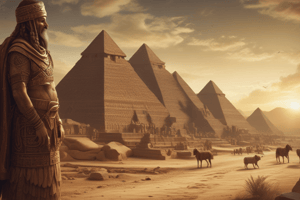Podcast
Questions and Answers
What was one of the significant contributions of the Sumerians to Mesopotamia's cultural legacy?
What was one of the significant contributions of the Sumerians to Mesopotamia's cultural legacy?
- Discovery of electricity
- Development of the first writing system (correct)
- Invention of the compass
- Introduction of the wheel
Where did the Sumerians emerge from before settling in southern Mesopotamia?
Where did the Sumerians emerge from before settling in southern Mesopotamia?
- Northern Zagros Mountains (correct)
- Southern African plains
- Eastern Asian deserts
- Central European forests
What major rivers did the Sumerians use for irrigation in Mesopotamia?
What major rivers did the Sumerians use for irrigation in Mesopotamia?
- Yangtze and Mississippi
- Nile and Amazon
- Danube and Rhine
- Tigris and Euphrates (correct)
What were some of the subjects recorded using the Sumerian cuneiform writing system?
What were some of the subjects recorded using the Sumerian cuneiform writing system?
Which Sumerian god or goddess was not mentioned in the text as part of their pantheon?
Which Sumerian god or goddess was not mentioned in the text as part of their pantheon?
What led to an expansion of settlements across Mesopotamia by the Sumerians?
What led to an expansion of settlements across Mesopotamia by the Sumerians?
What was a significant aspect of the Sumerians' religious beliefs?
What was a significant aspect of the Sumerians' religious beliefs?
What connection did the Sumerians have with the Akkadians?
What connection did the Sumerians have with the Akkadians?
Which statement best reflects the Sumerians' impact on subsequent civilizations in Mesopotamia?
Which statement best reflects the Sumerians' impact on subsequent civilizations in Mesopotamia?
What technology or craft did the Sumerians introduce that aided in trade?
What technology or craft did the Sumerians introduce that aided in trade?
Flashcards are hidden until you start studying
Study Notes
Sumerians and the Roots of Ancient Mesopotamian Civilization
The heartland of the Fertile Crescent, now known as Mesopotamia, is rich with historical layers that reveal the birth and development of some of humanity's earliest civilizations. One of the most significant contributors to this region's cultural legacy was the Sumerians, a people whose impact on Mesopotamia's ancient history is still felt today.
Origins and Settlement
The Sumerians emerged in the southern Mesopotamian plains around 2800 BCE, likely migrants from the northern Zagros Mountains. Their earliest settlements were linked to the development of urbanization, as they established cities such as Uruk and Ur, which would eventually grow into sprawling metropolises. The Sumerians' reliance on agriculture and their ability to harness the Tigris and Euphrates rivers' water for irrigation led to an expansion of settlements across the region.
Writing System
The Sumerians are also credited with creating the first writing system, known as cuneiform. Devised around 3400 BCE, cuneiform was a complex system that used wedge-shaped marks on clay tablets to record information. These documents provide valuable insights into Sumerian culture, including their astronomy, religious beliefs, and political history.
Religious Beliefs
The Sumerians were polytheistic, worshipping a pantheon of gods and goddesses that included Anu, Enlil, Enki, and Inanna. Their religious beliefs were deeply intertwined with their daily lives, and they sought divine guidance for everything from agriculture to warfare. The Sumerians also practiced divination, using omens and other methods to communicate with their gods and gain knowledge.
Economy and Trade
The Sumerians developed a complex economy based on trade and specialization. They engaged in long-distance trade with neighboring civilizations, exchanging goods such as textiles, metals, and agricultural products. The Sumerians also introduced new technologies and crafts, including the potter's wheel and the wheelbarrow.
Legacy
The Sumerians' legacy endures through their contribution to the development of writing, religion, and trade in the ancient world. Their influence can be felt in the subsequent civilizations that emerged in Mesopotamia, including the Babylonians, Assyrians, and Chaldeans. The Sumerians were also the ancestors of the Akkadians, another influential Mesopotamian people, and many Sumerian words were absorbed into Akkadian, the precursor of modern-day Hebrew and Arabic languages.
Conclusion
The Sumerians played a critical role in the development of ancient Mesopotamian civilization. Their innovations in writing, religion, and trade were the foundation for the region's rich cultural heritage, which continues to fascinate and inspire scholars, archaeologists, and historians. The Sumerians' legacy serves as a testament to the power and resilience of human creativity, as well as the profound impact of early civilizations on modern society.
References:
- Ancient History Encyclopedia. "Sumerians." Accessed on 22 February 2024. [Online]. Available: Link
- Metropolitan Museum of Art. "Sumerians." Accessed on 22 February 2024. [Online]. Available: Link
- British Museum. "Sumerians." Accessed on 22 February 2024. [Online]. Available: Link
- University of Cambridge Museum of Archaeology and Anthropology. "Sumerians." Accessed on 22 February 2024. [Online]. Available: Link
Studying That Suits You
Use AI to generate personalized quizzes and flashcards to suit your learning preferences.



